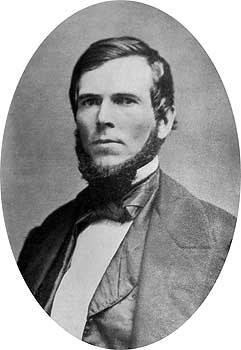The following account was take from the publication Echoes of the past about California, by General John Bidwell.
John Bidwell was a native of New York, being born in Chautauqua County on August 5, 1819. When he was ten years of age his parents removed to Erie County, Pennsylvania, and two years later to Ashtabula County, Ohio. Here and in Darke County (whither they subsequently removed) the boy grew to manhood, and from Ohio at the age of twenty years he set out, as his narrative records, on a career of western adventure and sojourn which was to continue to the end of his life. After visiting Iowa Territory and locating for a short time in the Platte Purchase of northwestern Missouri, he became in 1840-41 a leader of the first real overland party of American settlers to enter California--"the advance guard of the irresistible march of the American people westward."
It affords interesting food for present-day reflection that despite ample time for preparation and acquiring of information, no one knew the way from Missouri to California, nor did any of the party who persevered in the journey realize the fact when they had arrived there. The California to which Bidwell came was the California of the old régime--of mission stations and padres and Arcadian simplicity of life. The newcomer was one of the best examples of the new American society which was shortly to displace all this. A man of both physical and intellectual vigor, who early assumed a prominent part in affairs, Bidwell's residence in California from 1841 on qualified him to describe with first-hand authority the conditions which the later Argonauts were to encounter. His narrative was not written until almost half a century after the period it deals with, and the thoughtful reader will take proper cognizance of this fact. Yet seldom does an abler chronicler assume the task of describing events in which he has borne a part, and as a source of information upon the California of the forties its value is undoubted.
Bidwell lived until the fourth of April, 1900, and during almost sixty years he was one of California's foremost citizens. He bore an active part in Fremont's Bear Flag revolt of 1846 and in the subsequent American conquest of California. In 1849 he purchased Rancho Chico, a domain of some 22,000 acres of land in modern Butte County which had been granted to William Dickey by the Mexican authorities in 1844. Here he made his home throughout the remainder of his life, developing and administering his splendid estate. The ranch fronted four miles on the Sacramento River and extended to the foothills of the Sierra Nevadas, a distance of fifteen miles. Within its limits are some of the most fertile and beautiful valley lands that can be found, and Bidwell possessed both the means and the taste to develop their possibilities to the utmost. The estate was in itself a large community, having, when organized, no less than twenty subdivisions or ranches. Besides wheat and livestock, vast quantities of fruit and nuts were raised. At the time of Bidwell's death his several orchards numbered over 115,000 trees, while his vineyards covered some 200 acres of ground. At different times several packing houses and canneries were operated, and the season's output of preserved fruit frequently ran to 350,000 cases. Along with these operations, hundreds of head of cattle and horses, thousands of hogs and sheep, and tens of thousands of bushels of grain were being produced. Such an establishment necessarily required the services of a large number of people, and from the activities dependent upon Bidwell's establishment the city of Chico developed.
Throughout his life Bidwell was actively interested in civic affairs. His participation in the movement for California's independence has already been noted. In 1863 he was appointed brigadier-general of the State Militia. He served as delegate to several national nominating conventions and as a member of the Thirty-ninth Congress (1865-67). In later years he was actively identified with the Prohibition party, being its presidential nominee in the campaign of 1892.
In 1868 General Bidwell married Miss Annie Kennedy of Washington and the home to which he brought her became a noted center of hospitality. Numbered among its guests were such men as Asa Gray, Sir Joseph Hooker, John Muir, and David Starr Jordan. The range of General Bidwell's friendships may be suggested by putting in proximity to these names the statement that at his funeral four of the pallbearers were Rancho Chico Indians, three of whom had been unclad savages when he first became owner of the place; while little Indian children decorated the grave with wild flowers which they had gathered for this purpose.
